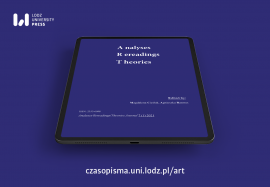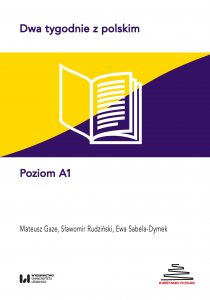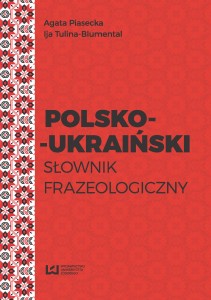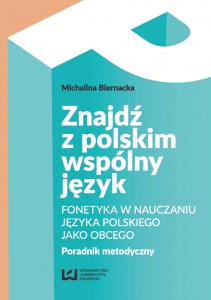Analyses/Rereadings/Theories: A Journal Devoted to Literature, Film and Theatre | Vol. 7
Opublikowano: 1 marca 2023

Zapraszamy do lektury nowego numeru Analyses/Rereadings/Theories (A/R/T Journal).
Recenzowane czasopismo zostało stworzone z myślą o zapewnieniu forum do analizowania i omawiania zagadnień mających bezpośrednie znaczenie dla współczesnych studiów literackich i kulturoznawczych. Czasopismo wyraża przekonanie, że krytyka akademicka powinna być łatwo dostępna na całym świecie. W związku z tym każdy z numerów jest publikowany w Internecie i dostępny do bezpłatnego pobrania.
W Tomie 7 zamieszczono 4 artykułów naukowe z zakresu literaturoznawstwa i kulturoznawstwa anglojęzycznego, skupiające się na sztukach performatywnych:
Timothy Bridgman
This research compares two important British live entertainment mega-events held at Wembley Stadium in London, and examines their attempts to distance themselves from the mentioning of political conflict or war. The paper will argue that the Live Aid concert in 1985 and UEFA EURO 2020 final, held in 2021, despite being separated by thirty-six years, share many common features which, in turn, determined their approach to social responsibility. The paper will support this claim by explaining the two events’ official social responsibility programs and providing examples of performer activism occurring within a small window left open for independent free speech. It will conclude that despite the prominence allocated to addressing social issues at both events, anti-political conceptualisation prevailed, resulting in the avoidance of all mentioning of political conflict and war. It proposes that it is only through the analysis of activism that it becomes possible to understand the complexity of the political realities surrounding a major live music or sporting event.
Religious and Emotional Communities in John Heywood and John Bale’s Interludes
Adam Christ
The paper examines emotional communities in early modern English drama, specifically interludes by John Heywood and John Bale. It explores the connections between emotion and religion, and seeks to uncover whether and how emotionality changes according to the politically acceptable religious doctrine – particularly in the time of Protestant reformation under Henry VIII Tudor – and how these changes are expressed in the early sixteenth century English interludes by a Catholic (Heywood) and a Protestant (Bale) author. This paper considers early modern texts of culture which have not been researched as broadly as the drama of the later English Renaissance period (such as works by William Shakespeare or Christopher Marlowe), and, drawing upon the concept of “emotional communities” introduced by Barbara Rosenwein, additionally offers insights into an ongoing discussion on emotions in history.
Symptomizing Crises. Theatres of the Pandemic – Isolated But Open and Inside/Outside
Edyta Lorek-Jezińska
My aim in this article is to look into manifestations of the corona crisis in theatre and performance as well as representations of other conflicts and problems, revealed or intensified by the pandemic. Drawing upon theories on the social influence of the pandemic developed by Snowden, Žižek and Neiman, I examine the potential of the pandemic theatre to critique and change the existing structures and to envision a more caring and considerate society. My analysis focuses on two British theatre projects: Inside/Outside: Six Short Plays (2021) and Isolated But Open: Voices from Across The Shutdown (2020) and their representations of the conflicted reality of the pandemic, addressing the questions of limitations and restrictions of rights and freedoms, on the one hand, and care and protection, on the other. The plays expose the conflicts between survival and life worth living, inside and outside, and the problems of the new normal and its life-changing potentials.
Veronika Schandl
The paper wishes to document a recent trend visible in the Hungarian independent theatre scene – a turn towards social, political issues, as well as a growing sensitivity towards the visible tensions in Hungarian political discourse. It does so through the analysis and the contextualization of two recent Hungarian independent theatrical productions. Studio K’s 2019 Sacra Hungarica is an in-your-face attempt to portray the current distortion of the language and the abuse language is used for, while Béla Pintér’s Blood Red, Off-White, Dark Green, a clever Oedipus Rex paraphrase that depicts marginalization, racism, and nationalism in a pointedly non-pc allegory.
The essay introduces the status of independent theatre vis-à-vis politics after 1989 and will delineate the changes the conservative governments brought into the alternative scene. Then, through an in-depth analysis of the above-mentioned two productions, it discusses the various means of theatricality they use to comment on contemporary Hungary.
Począwszy od tego tomu w A/R/T będzie ukazywać się dział „A/R/T in Practice”, w którym będą zamieszczane recenzje, wywiady, prace twórcze i referaty dotyczące metodyki nauczania tekstów literackich i kulturowych.
Dział rozpoczyna się od krytycznego eseju Rowlanda Cotterilla Shakespearean Doubling: Issues of Action, Theme and Stage Presence, który stanowi odpowiedź na Shakespeare’s Double Plays: Dramatic Economy on the Early Modern Stage (2018) Bretta Gamboa i jego sugestię, że „znacząca większość sztuk Szekspira nie tylko może być wystawiana, ale przeznaczona do wystawienia przez zaledwie dwunastu aktorów”. Coterrill analizuje takie możliwości z perspektywy kogoś, kto nie tylko obszernie przestudiował twórczość Szekspira i widział wiele dzieł w inscenizacji, ale także wyreżyserował liczne spektakle studenckie, co w ciekawy sposób przedstawia „szekspirowskie dublowanie” z ich możliwościami, ograniczeniami i znaczeniami.
Następnie opublikowano dwa różne, a jednak powiązane ze sobą utwory napisane przez Johna Crusta, na temat prac niemieckiej dokumentalistki Tanji Cummings. Crust recenzuje film z 2015 Line 41, którego tytuł wywodzi się od „tramwaju, który jeździł przez [Litzmanstadt] getto, łącząc jedną część miasta z drugą”. Jego druga praca opiera się na wywiadach z reżyserką na temat jej innego projektu w Café Zelig: A Seniors’ Hangout and a Whole Lot of History, wydanym w 2020 roku. Crust pokazuje, że druga praca jest kontynuacją jej wcześniejszych zainteresowań nieopowiedzianymi historiami ocalonych z Holokaustu. Tym razem przenosimy się z Łodzi do Monachium, które po wojnie stało się domem dla wielu Żydów, wciąż regularnie spotykających się w Café Zelig.
W tomie zamieszczono intrygujące opowiadanie Borysa Fynkelshteyna O Venice!, które, jak wyjaśnia wstęp Dmytro Drozdowskiego, sugeruje, że tytułowy bohater Kupca weneckiego miał swój pierwowzór w prawdziwej osobie, która mogła się spotkać z Williamem Szekspirem. Najbardziej zaskakującym aspektem tego utworu jest sugestia Fynkelshteyna, oparta na badaniach przeprowadzonych w Wenecji, że „tytułowy kupiec sztuki Szekspira opierał się na krewnym Fynkelshteyna”.
Tekst Piotra Spyry Teaching Psychomachia in The Castle of Perseverance zamyka część „A/R/T w praktyce” bardzo szczegółową analizą The Castle of Perseverance, dającą podstawy teoretyczne przed przejściem do dyskusji z uczniami. Spyra sugeruje skupienie się na inscenizacji sztuki, jej alegorycznych postaciach, ruchu scenicznym Ludzkości, a także „świadomości różnicy w strategiach językowych i retorycznych stosowanych przez Dobrego Anioła i Złego Anioła”, aby umożliwić uczniom pełniejsze zrozumienie zawiłości sztuki, która miała wielki wpływ na późniejsze dzieła dramatyczne.
A/R/T in Practice:
Agnieszka Rasmus
Shakespearean Doubling: Issues of Action, Theme and Stage Presence
Rowland Cotterill
Tanja Cummings’ Line 41: A Reflection
John Crust
Café Zelig: A Seniors’ Hangout and a Whole Lot of History
John Crust
O VENICE! By Borys Fynkelshteyn
Dmytro Drozdovskyi
Teaching Psychomachia in The Castle of Perseverance
Piotr Spyra
Komentarze
Ten post dostępny jest także w języku: angielski





